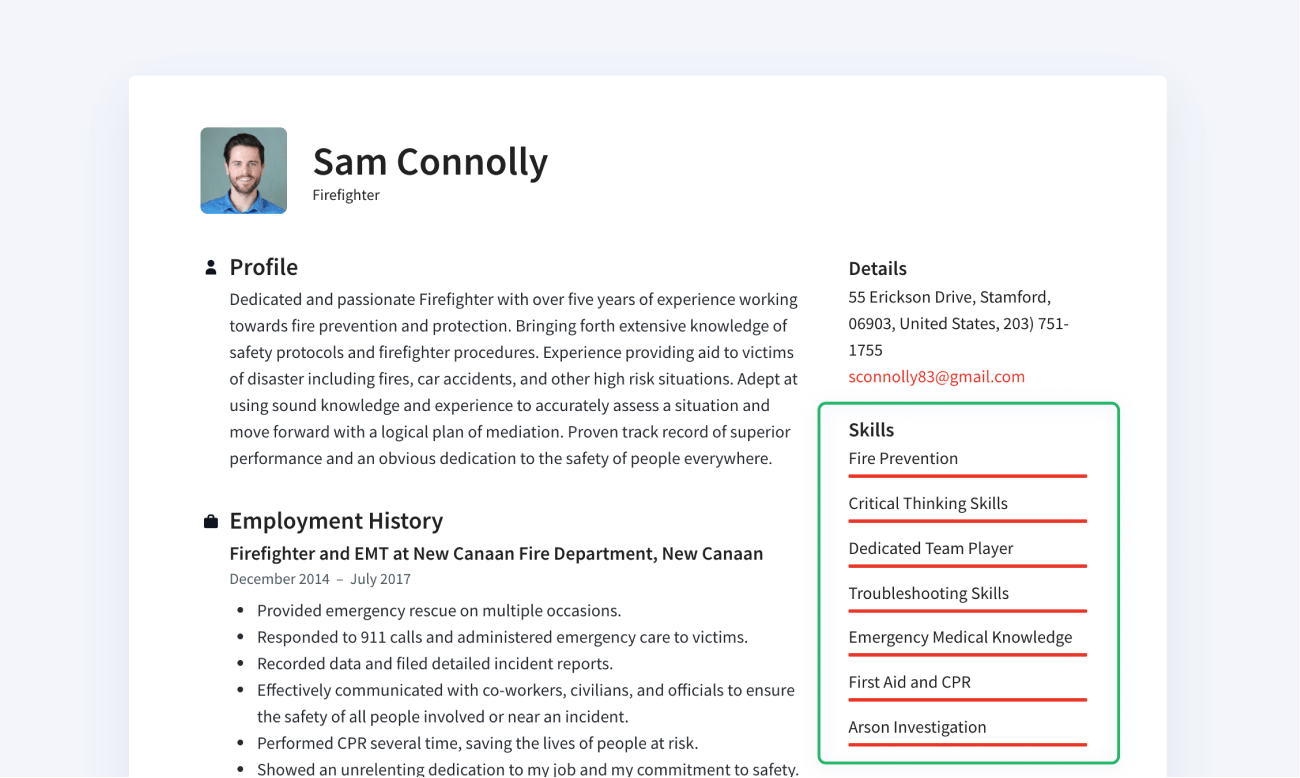
When you are making your case for a new job, it is your blend of resume skills that will show a hiring manager whether you are qualified for the role.
These resume skills might be listed in a specific section, described within your work experience, or even subtly implied in the summary, and they are an essential ingredient in your job search story. They are the foundation of your achievements.
The thing is, once you have listed a skill in your resume you have to be able to back it up with the career story that lies behind it. Resume skills are the talents, traits and wisdom that you have acquired throughout your education and career. This guide will cover how to go about showcasing your resume skills to the best effect, including:
- Why skills are your job search currency
- The difference between hard skills and soft skills
- Key rules for listing your resume skills
- Tips to match your skills to the job requirements
- How to convey your level of proficiency
- Top ten skills for ten common job functions
- Top ten skills for ten common professions
Why skills are your job search currency
When you sit down to consider your next career move, you could do a lot worse than sitting down and listing all the things that you are good at. Then have a think about how these skills have contributed to your achievements and you will be able to sense how you will go about convincing your next boss to give you a job.
Your resume skills are your job search currency because they show a hiring manager whether you have what it takes to do a job. If you can share examples of your skills in action, they are the ultimate objective measure of your ability.
The difference between hard and soft skills
Hard (or technical) resume skills are all the practical, industry-specific tools and know-how needed for a job. Hard skills are quantifiable and usually learned in school, on the job, or training. Hard resume skills can usually be tested and are sometimes verified during the hiring process.
A modern trend we see across the millions of resumes created with ResumesMadeHere is that more job seekers use hard skills to optimize the keywords on their resume. This strategy is an especially important step for candidates applying to larger companies who are likely to use Applicant Tracking Software (an ATS) to automatically filter and score resumes based on a list of keywords in the job description.
Soft resume skills are usually aspects of your personality, work style, or effectiveness that are harder to measure or quantify. Soft skills are especially important for positions of leadership or positions where you are interacting with customers.
Once hiring managers assess your hard skills to know you can get the job done, they look to your soft skills to know if you can get the job done well. For many modern offices and creative start-ups, a company culture fit could be the edge over someone with the same hard skills. Soft skills speak louder in some situations.
Profession-specific examples of hard and soft skills
Hard skills (Doctor): Surgery, Post-Operative Care, Emergency Medicine, Diagnosis.
Soft skills (Doctor): Team Management, Leadership, Compassion, Empathy.
Hard skills (Sales Rep): Salesforce, Sales Development, Lead Qualification, Pipeline Management.
Soft skills (Sales Rep): Communication, Decision-Making, Focus, Integrity, Influencing.
Hard skills (Waitress): Aloha POS, Customer Service, Inventory Management, Bartending, and Food Prep.
Soft skills (Waitress): Positive Attitude, Reliable, Communication, Hard Working, and Responsible.
Key rules for including resume skills
1. Demonstrate an impressively rare skill set
One of the best ways to send a hiring manager to sleep is to include the same resume skills as every other candidate. When they read the words communication skills for the tenth time, they will mentally pigeon-hole you with all the rest of the average candidates.
If they think that you are average because you have included the same average skills as everyone else, it will be incredibly hard to shift that perception if you are lucky enough to be invited to an interview
2. Avoid excessive resume skill repetition
When you have multiple places to share your skills, it is easy to think that repetition is a powerful way of getting your message across. Believe me, it isn’t. Even if you use different words to describe the same resume skill, you need to realize that your resume real estate is far too valuable to be doing this.
In order to come across as a rounded professional, you should seek to highlight as many different skills as possible in the skills section, employment history and summary. By all means, repeat a couple of the really core resume skills, but variety is definitely your friend.
The more skills that a hiring manager can read on a resume, the more interesting the potential interview with you might prove.
3. Ensure your top resume skills are the most visible
In the table below you can find the three places to list your resume skills. There are different ways to describe your skill set to a potential employer, but if there are skills that you want to shout about from the rooftops, you should absolutely put them (or describe them) in your summary or skills section.
You might think that a potential employer might read every detail of your work experience, but that may not be the case for many reasons. You can’t afford for critical skills to be lost in your general work experience, so put them at the top of your resume in the summary or in the specific skills section (where they are most visible but have the least context).
Three places to list your resume skills
Skills section. As a typical skills section contains 6-7 key skills, only the rarest and most impressive skills should get on your list. Mostly include your harder and technical skills here as your soft skills can come across in what you achieved in your work experience and in your summary. Suggested ratio of 2:1 in favour of hard skills.
Work experience. Sometimes your skills speak for themselves if you describe your accomplishments well enough. If you mention that you saved 15% on the annual equipment spend you won’t need to state the obvious and wax lyrical about your negotiation skills. Be smart in the language that you use and what lies behind it.
Summary. The summary section is the most important 3-4 lines on your resume and it should be dripping with your top skills, both described and implied. It is okay to repeat the rarer skills that are in your skill section – you need the hiring manager to read that far, after all. Don’t be afraid to bring out the big resume skill guns.
Tips to match your skills to job requirements
When adding resume skills, it helps to know your audience. As you apply to jobs, consider three sources to understand how your audience might react to the resume skills: the job description, the company, and the industry.
Read the job description to understand the important keywords and tone of voice. How does the job description talk about skills? Are there any required skills? Be sure to list and talk about skills on your resume in a similar way the job description uses.
Research the company to figure out the company culture. Does the company put an emphasis on innovation and learning? Does the company seem like it would have an appreciation for creative skills or like they might put a stronger emphasis on soft skills? Know what type of skills the company values overall and be sure to include those skills on your resume.
Understand the industry to align the skills on your resume with the expectations of your industry. Demonstrate your experience and industry knowledge by talking about the skills on your resume exactly the way an industry insider would expect.
How to convey your level of skill proficiency
The difficult thing with a resume is that it is difficult to indicate that level of proficiency you have in a certain skill. If your ability with Excel is basic, you might think twice about including it in your skills section, but not including it might mean that the ATS rejects you before a hiring manager has even read a word.
One easy solution for this is including a skills section that has a graphical representation for the level of skill (with bars, stars or some other visual effect). This is quite basic, but it is effective and will allow you to include those must-have skills without having to overplay your experience.
It is true to say that your experiences will give an indication of your proficiency in certain skills, so don’t waste too much resume space in detailing exactly what level of skill you possess in a certain area. That will come at a later stage in the interview.
Top ten skills for 10 common job functions
Ten by ten iframe tables with top ten skills by function (data table to come)
Top ten skills for 10 common professions
Ten by ten iframe tables with top ten skills by ten professions (data table to come)
 ResumesMadeHere
ResumesMadeHere